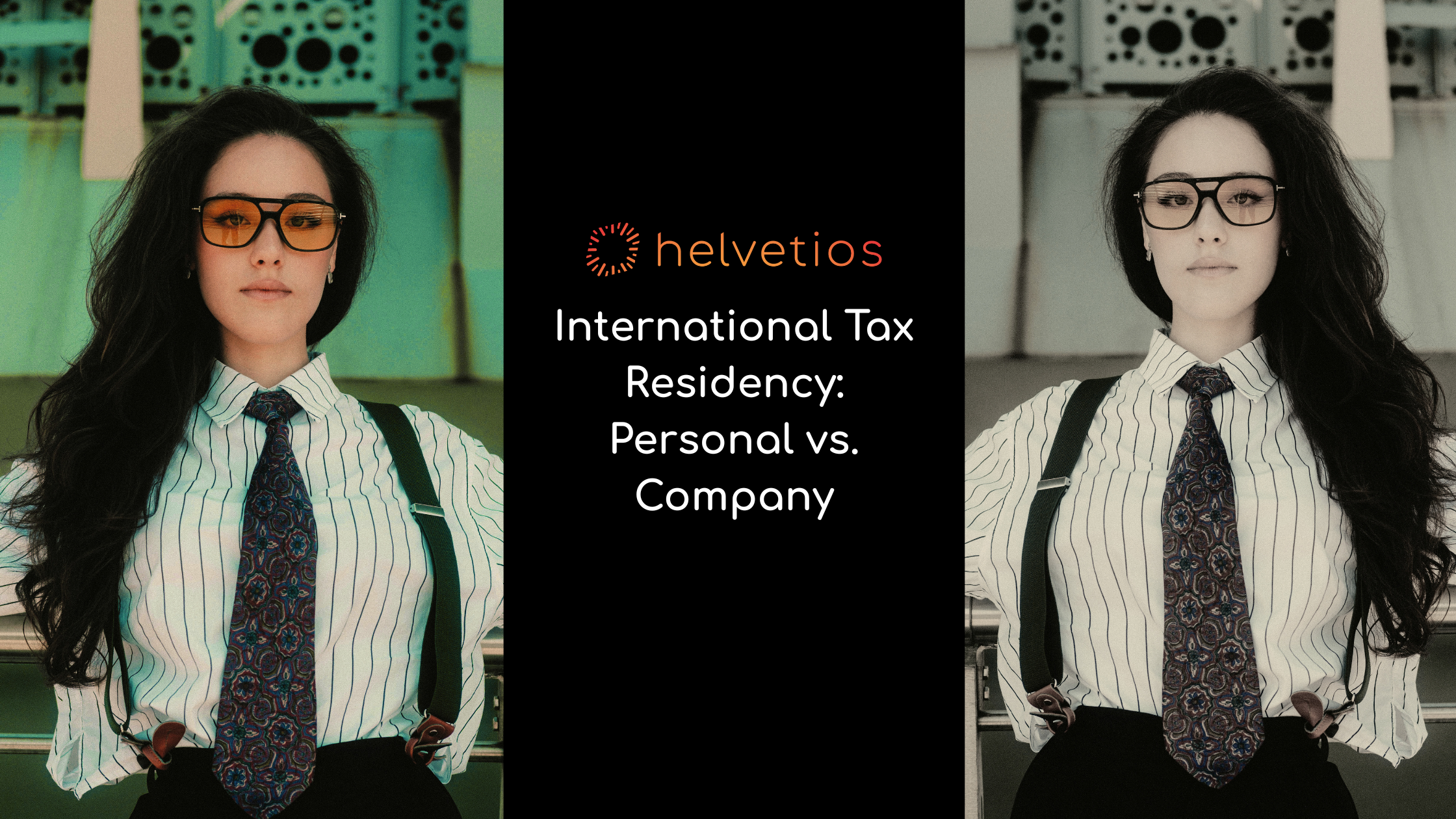Introduction: The Global Entrepreneur’s Tax Maze
In today’s borderless business environment, entrepreneurs often live in one country, incorporate their companies in another, and serve clients worldwide. While this flexibility brings significant opportunities, it also introduces complex tax issues.
A common misconception is that incorporating a company automatically determines tax obligations. This oversimplification can be dangerous.
Understanding the difference between personal and corporate tax residency is crucial to avoid double taxation, compliance penalties, or unexpected tax liabilities.
At Helvetios.eu, we frequently guide international entrepreneurs and digital nomads through this precise maze. We understand that clarity on tax residency is not just about compliance; it’s about strategic planning and peace of mind.
This article will demystify these crucial concepts, explain why they matter, and provide you with the essential knowledge to navigate your global tax obligations effectively in 2025.
1. What is Tax Residency? (Personal vs. Company)
Personal Tax Residency
This is the country where you are considered a resident for tax purposes. Your worldwide income may be taxed there.
Most countries determine personal residency based on:
- 183-Day Rule: If you spend 183+ days (6+ months) in a country, you’re typically considered tax resident.
- Permanent Home: Do you have a place to live, even if you’re not there full time?
- Center of Vital Interests (CVI): Where are your social and economic ties strongest?
- Habitual Abode: Where do you usually live over time?
Many digital nomads may unintentionally trigger dual residency, increasing their tax exposure.
Company Tax Residency
This refers to the country where a business is taxed on its profits. It is not always where it is incorporated. Key factors include:
- Place of Effective Management (POEM): Where strategic decisions are actually made.
- Control and Management: Who exercises day-to-day control and from where?
POEM is the dominant factor in 2025, as reaffirmed by court rulings and tax authorities worldwide.
2. Why Does it Matter? The Implications of Misunderstanding.
Mistakes Can Be Costly:
- Double Taxation: Income taxed in two countries due to overlapping residency.
- Non-Compliance Penalties: Fines, interest, and reputational damage.
- Permanent Establishment (PE): Operating your business from a different country than where it’s incorporated can lead to unwanted tax obligations there.
- Banking & Legal Risk: Misalignment can complicate bank accounts, investor due diligence, and long-term planning.
3. How to Determine Your Personal Tax Residency in 2025
Common global criteria still apply:
- 183-Day Rule (6 months) (Income tax abroad – Your Europe)
- Permanent Home: Owned or rented accommodation available long-term
- CVI Test: Family, job, and investments
- Habitual Abode: Long-term patterns of presence
Always consult the specific tax rules of any country where you might qualify as a resident.
4. Determining Your Company’s Tax Residency (and why it’s not always where you incorporated!)
Many entrepreneurs mistakenly think a company incorporated in Estonia or a UAE Free Zone is tax resident there. That’s not always the case.
POEM, now reinforced in treaties and case law, is the decisive test (India Briefing). If you live in Germany but run your Estonian company remotely, your company could be deemed German tax resident.
Additionally, many countries now enforce:
- Economic Substance Regulations (ESR): You must show real local activity (office, employees, expenses)
- UBO Transparency: Disclosure of Ultimate Beneficial Owners is mandatory in many countries
5. Dual Residency & Double Taxation Agreements (DTAs)
If you or your company are tax resident in two countries, Double Taxation Agreements (DTAs) help avoid double taxation.
- Tie-Breaker Rules: Prioritize home, CVI, habitual abode, and POEM
- Mutual Agreement Procedures (MAPs): Increasingly used to resolve disputes
- Recent Treaties (e.g., Italy–China 2025) emphasize MAPs but still respect POEM
6. Common Pitfalls for Global Entrepreneurs
- Digital Nomad Trap: Incorporate in one place, live and operate from many
- Remote Directors: Managing your company from high-tax countries
- Holding Companies with No Substance: Risk being taxed where POEM or actual control is found
7. How Helvetios.eu Can Help Ensure Compliance
At Helvetios, we go beyond basic company registration. Our experts help ensure:
- Tax Residency Assessments for individuals and companies
- Compliant Structuring based on POEM, ESR, and global tax trends
- DTA Guidance to avoid dual taxation
- Substance Implementation with real offices, staff, and processes
- Ongoing Compliance Support across jurisdictions
Conclusion: Clarity is Key to Global Tax Compliance
Tax residency isn’t just a checkbox — it’s a cornerstone of your international business strategy. Missteps can cost you money, time, and credibility.
Understand the difference between where you live and where your company is managed. Align your operations with residency rules to maximize tax efficiency and peace of mind.
Ready to get clarity and control?
👉 Contact Helvetios.eu for a tailored tax residency consultation.
FAQs (Updated 2025)
1. Can my company be tax resident in a different country than where it’s registered?
Yes. POEM determines tax residency for companies in many jurisdictions.
2. What is the 183-day rule?
Spend 183+ days in a country and you’ll likely be considered a tax resident. But other factors also apply.
3. What happens if I’m tax resident in two countries?
DTAs often resolve this via tie-breaker rules or MAPs. If no DTA, double taxation risk is higher.
4. What is “economic substance”?
Proof that your company genuinely operates in its registered jurisdiction. This includes staff, office space, and expenses.
5. How do I prove POEM?
Keep board minutes, show local decision-making, and demonstrate that directors reside and act from the intended jurisdiction.
6. Should I get expert advice?
Absolutely. Tax residency is complex, and mistakes are costly. Helvetios helps international entrepreneurs stay compliant, efficiently.









